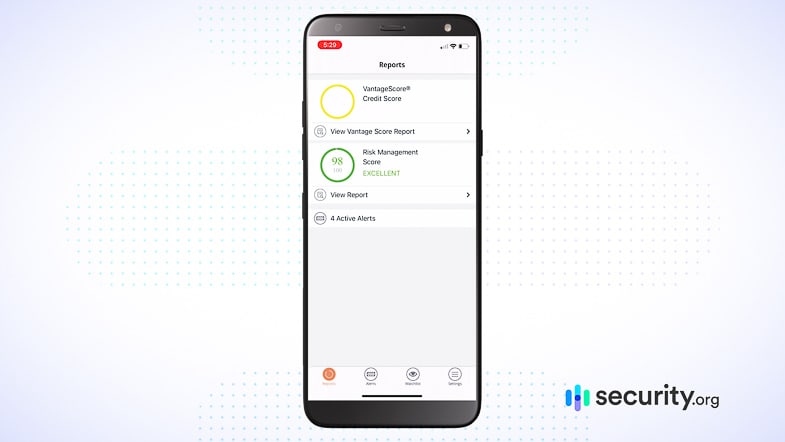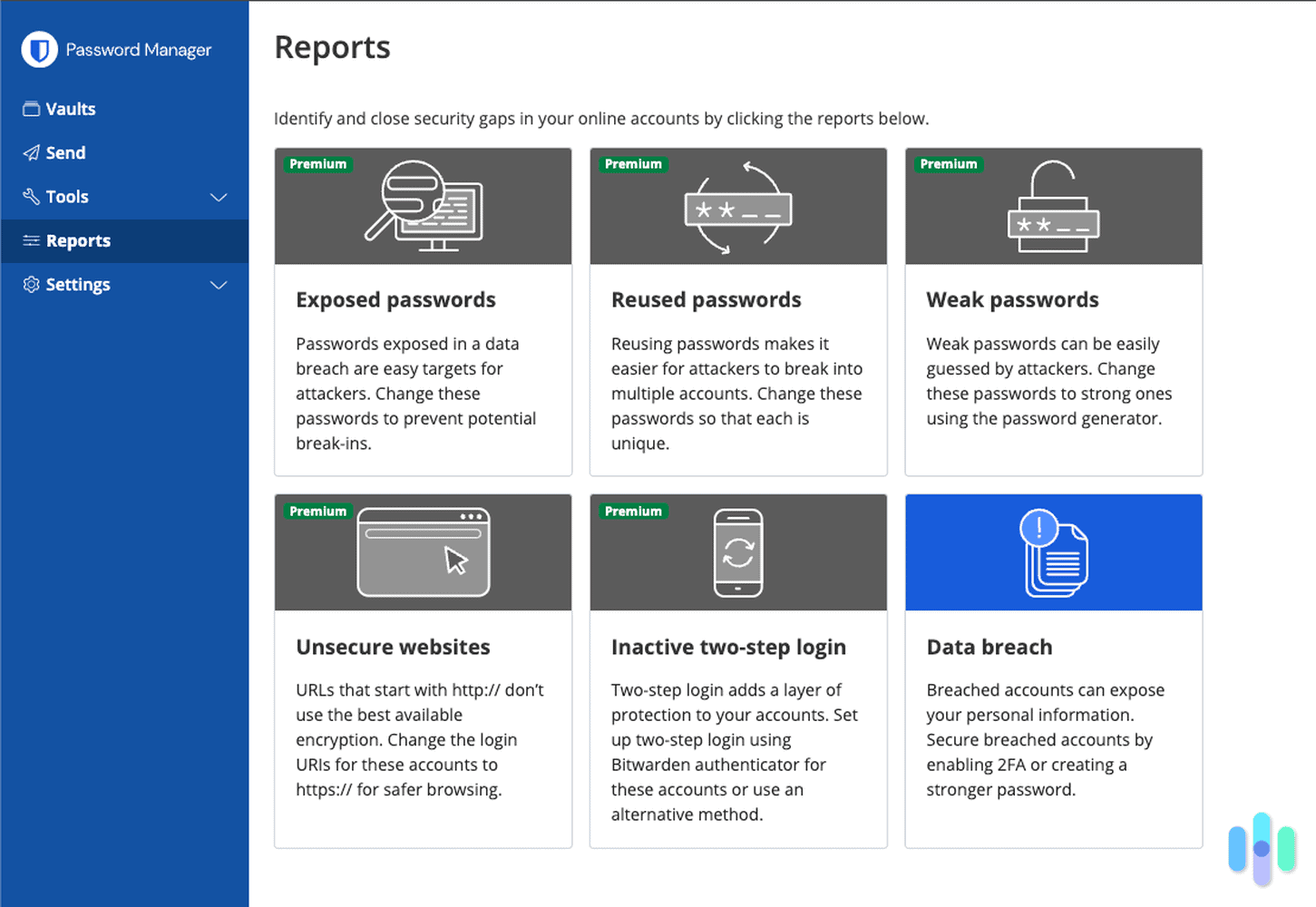Identity Guard ID Theft Protection Review
If you value timely and detailed alerts, we found that Identity Guard is one of the best options in the industry
 Aliza Vigderman, Senior Editor, Industry Analyst
&
Aliza Vigderman, Senior Editor, Industry Analyst
&
 Gabe Turner, Chief Editor
Last Updated on Oct 15, 2025
Gabe Turner, Chief Editor
Last Updated on Oct 15, 2025
What We Like
- Affordable basic protection: Basic plans start at $7.50 per month for individuals and $12.50 per month for families, which is at the low end of the market. Additionally, family plans can cover a lot of people: up to five adults and unlimited children.
- $1 million reimbursements: We felt good knowing that we were insured for up to $1 million if anyone should manage to hijack our identities.
- Powerful identity monitoring: Identity Guard uses its partnership with its parent company, Aura, to deliver comprehensive identity protection.
What We Don't Like
- Cheapest plan doesn’t include credit monitoring: If you’re looking for comprehensive identity theft protection, the cheapest plan isn’t a good choice due to its lack of credit monitoring. Credit monitoring is available starting at $16.67 per month for individuals and $25 per month for families.
- Unimpressive app: While it’s easy to use, Identity Guard’s app isn’t as comprehensive as we had hoped.
- Limited proactive protection:: Although all plans include a Safe Browsing feature and password manager, Identity Guard has yet to offer a VPN, which is becoming an increasingly common feature included with identity theft protection services.
Bottom Line
Identity Guard has been one of the best identity theft protection services for over 25 years. Plans come with vital features such as a data removal service, dark web monitoring, and credit monitoring, to name a few. Prices start at just $7.50 per month, but is it worth it?
We’ve tested dozens of identity theft protection services and solutions that keep your information off data broker sites. While we like that Identity Guard uses AI to offer top-of-the-line protection, there are some limitations, particularly on cheaper plans. Let’s break down Identity Guard’s service to see if it’s right for you.
>> Learn More: A 2025 Guide to Identity Theft Protection
- Identity theft protection powered by AI
- Impressive $1 million in identity theft insurance
- Multiple service levels, from basic to advanced
Video Review
Identity protection services are complex, so this review is going to be long. If you prefer watching to reading, see our Identity Guard video review below. Gabe Turner, an attorney and our Chief Editor, breaks down Identity Guard’s features and app, and shows just how well it works in protecting identities and personal information.
Features
Identity Guard and services like it are designed to catch telltale signs of identity theft so you can quickly react and mitigate or prevent damage. Identity Guard does that by monitoring credit accounts, financial accounts, the dark web, and news reports, and other areas where signs of your identity being stolen could pop up.
We signed up for Identity Guard’s Ultra plan, which offers comprehensive protection. The package includes three-bureau credit monitoring, data breach notifications, and white glove fraud resolution if our identity is stolen. Our subscription also monitors social media, home titles, the USPS, and more. This is especially useful in case criminals start creating fake accounts in our name.
>> Read More: A 2025 Guide to Personal Digital Security & Online Safety
From Our Experts: Identity theft protection services can’t completely prevent identity theft. Their purpose is to detect the early signs your details might have been stolen so you can take action and defend yourself from significant losses.
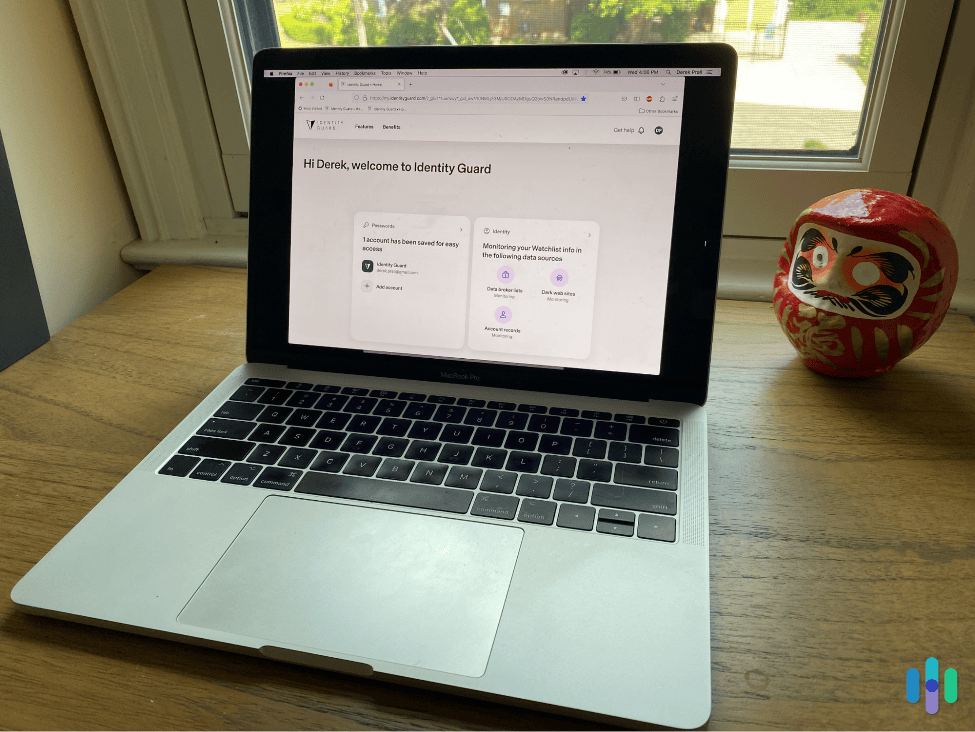
Credit Monitoring
According to our Identity Theft Consumer Shopping Study, credit monitoring is a core function most shoppers look for. Fortunately, it’s also a common feature in identity protection services.
During our testing, we applied for a student loan, which was flagged by Identity Guard through one of the major credit bureaus. If you’re concerned about an individual line of credit, you can use Identity Guard to activate a fraud alert. Keep in mind that credit and debit monitoring are only available on the Ultra plan.
This type of protection isn’t available in Identity Guard’s basic plan. Only the Total and Ultra packages offer three-bureau credit monitoring. If you’re looking for a budget-friendly option, we recommend signing up for a LifeLock plan. LifeLock offers one-bureau credit monitoring for the same price as Identity Guard’s value plan. You can see how else they differ in our LifeLock and Identity Guard comparison.
Financial Monitoring
Identity thieves can cause more harm than damaging your credit score. They target all of your bank accounts. Some may even attempt to drain your 401(k) and cryptocurrency wallets. That’s why Identity Guard monitors all of your finances. They also display the personally identifiable information banks use to verify activity, so you know which pieces of information to protect most.
Once again, the Value plan offers limited coverage for high-risk transactions. The middle-tier plan expands financial monitoring to include bank accounts. Our Ultra plan was the only one that provided comprehensive coverage, including monitoring credit cards, investment accounts, and retirement accounts.
Identity Protection
We added all the information we wanted monitored to our Identity Guard account. This included our name, address, birth date, and Social Security Number. Identity Guard did an initial scan of the internet and dark web, and thankfully didn’t find anything. It will continue monitoring 24/7 and alert us if our details show up.
Here’s exactly what we got from our Identity Guard subscription.
- Dark web scan: The dark web remains a thriving marketplace for stolen identities. Cybercriminals sell complete stolen identities for as little as $16.1 Identity Guard continuously monitors these hidden corners of the internet, alerting us immediately when our credentials surface.
- Criminal and sex offense monitoring: If the system found our names on a sex offender registry or police report, it would have notified us right away, but thankfully, this didn’t happen to us.
- USPS address change monitoring:We moved apartments while testing Identity Guard, and of course, we had to change our address registered to the USPS. The same day we did, Identity Guard notified us that an address change was filed. If it were a real thief trying to forward our mail (which contains tons of personal information) to their address, we would have been alerted.
- Home title monitoring: Identity Guard would alert us if anyone tries to open a home title in our names or transferring it to someone else.
- Risk management report: Identity Guard produced a report that showed us how at risk we were for identity fraud.
- Safe browsing tools: We use Identity Guard’s browser extension to block ads, trackers, and phishing websites. It even protects us from web mining, which is when a hacker attempts to collect our data without us knowing.
- Anti-phishing mobile app: Aside from the Identity Guard Classic app, the company offered us the Anti Phishing by Identity Guard mobile app, which detected and blocked phishing websites on Chrome, Dolphin, and Samsung Internet.
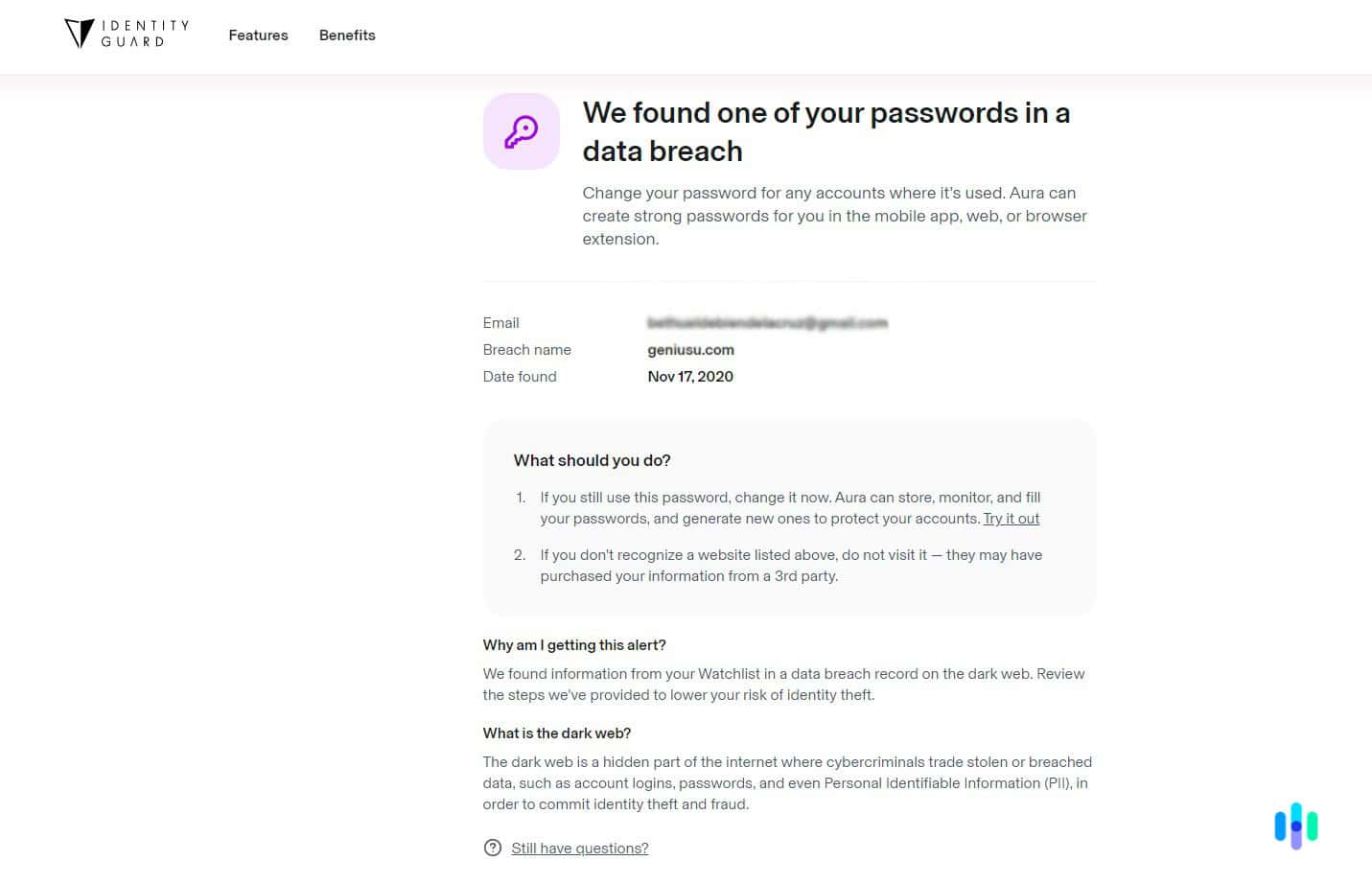
One aspect we liked was the detail in every alert we received (see screenshot above). Right after signing up, Identity Guard used the information we provided to do an initial scan and found a data breach where the email entered was involved. It shows where and when the breach happened, where it found the breached information (dark web), and how it could impact us.
Pro Tip: If you prefer fewer monitoring alerts, we recommend Aura. When we reviewed Aura, it kept non-emergency notifications to a minimum. You can still review them in the app, but you don’t get overwhelmed with alerts and emails.
Identity Guard even provides tips on how to fix the problem. There’s a section titled “What Should You Do?” with a list of steps you can take to reduce the impacts. If it’s your first time dealing with identity theft or data breaches, these tips are invaluable and save you Googling for suggestions.
Some people prefer receiving fewer alerts and reminders, and if that’s the case for you, Aura might be a better fit. When we tested Aura, we found that it sends fewer non-emergency notifications than Identity Guard. We still had the option to see tips and security areas we could improve on in the app, but it didn’t bother us with notifications and email alerts.
Insurance and Restoration
Like we said from the start, no identity protection service can truly prevent identity theft. That’s why insurance and identity restoration should be included in all identity protection packages.
Identity Guard provides up to $1 million insurance for identity theft victims. It covers stolen funds, legal fees, lost wages, and even childcare expenses incurred during recovery. While this matches the industry standard, we’ve seen some competitors like LifeLock’s Ultimate Plus plan now offer up to $3 million in coverage, and McAfee+ Ultimate provides $2 million.
If you’re on the Ultra plan, Identity Guard will also assign you a dedicated case manager to resolve the case. They’ll send letters and file disputes to your credit card companies on your behalf. This service is a time-saver and another reason to consider upgrading to the Ultra plan.
Identity Guard Identity Theft Protection Features
| Monthly cost for first-year plan | $7.50 – $25.00 |
|---|---|
| Credit score monitoring | Yes |
| Sex offender registry monitoring | Yes |
| Risk management report | Yes |
| Identity theft insurance reimbursement maximum | Up to $1 million |
| Live chat customer support | No |
| Customer information shared with third parties? | Yes |
Privacy and Security
When we were signing up for Identity Guard, we were thinking, “Boy, they are collecting a lot of our sensitive, personal information.” That got us thinking about the famous quote from bank robber Willie Sutton, who said he robbed banks because “that’s where the money is.” The idea that Identity Guard keeps our personal information is a big reason why we took a close look at the company’s data security and privacy policies.
Through that search, we found that Identity Guard uses military-grade AES-256 encryption to protect your data.2 They also maintain SOC 2 Type II certification to prove their commitment to cybersecurity best practices. We were also happy to find out that Identity Guard’s privacy policy only allows them to share data for essential purposes, such as reporting fraud to regulatory agencies.
>> More ID Theft Reviews: Lookout Identity Protection
Identity Guard, however, does share some types of information with its corporate partners and service providers, but these types of information come from when you visit its website or sign up for a plan. That includes your email address, device information, and IP location — things that other websites you visit already likely collect and share.
Pro Tip: Want to keep your browsing data, device information, and IP location private? Use a VPN or virtual private network. A VPN will encrypt your traffic and hide your IP address for your privacy, so you can browse the internet more anonymously.
User Experience
Identity theft protection services are pretty much a set-and-forget type of service. Once you’re done setting it up with all the information you want to protect, you can just let it be. It will monitor data points and key areas to make sure the information you provided doesn’t fall into the wrong hands.
As such, the user experience hinges heavily on the set up process. Identity Guard wasn’t the simplest to set up, but the process was streamlined enough that we could call it user-friendly.
It took us about 15 to 20 minutes to set up our protection. We started by selecting a plan and creating an account. Then, the platform asked us to input our personal information, including our SSN, addresses, and financial accounts. They also asked us targeted questions to create a risk profile they used to fine-tune our protection.
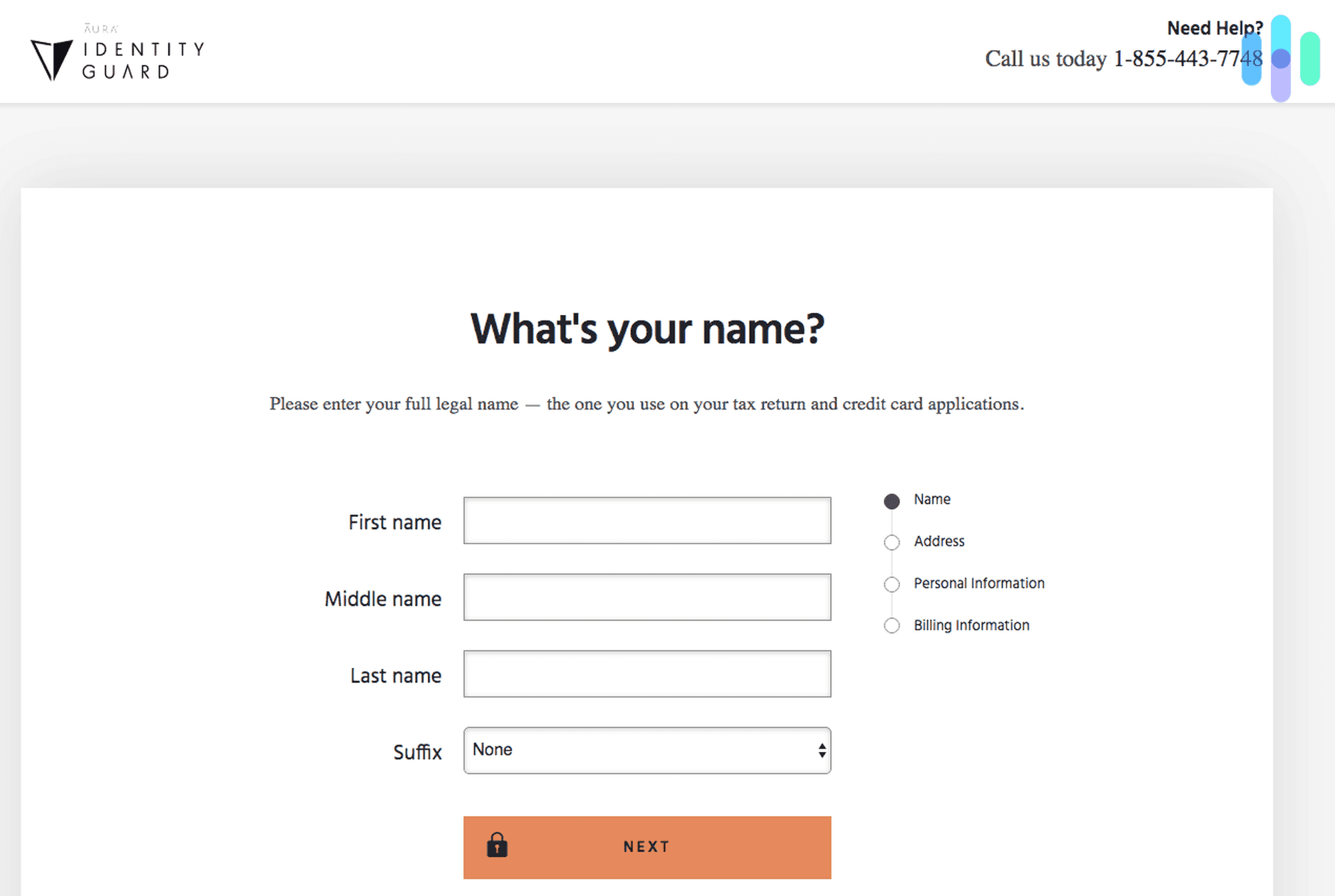
The more information we gave Identity Guard, the more data they could spit back at us, especially for the AI-powered features like the social insight and risk management reports.
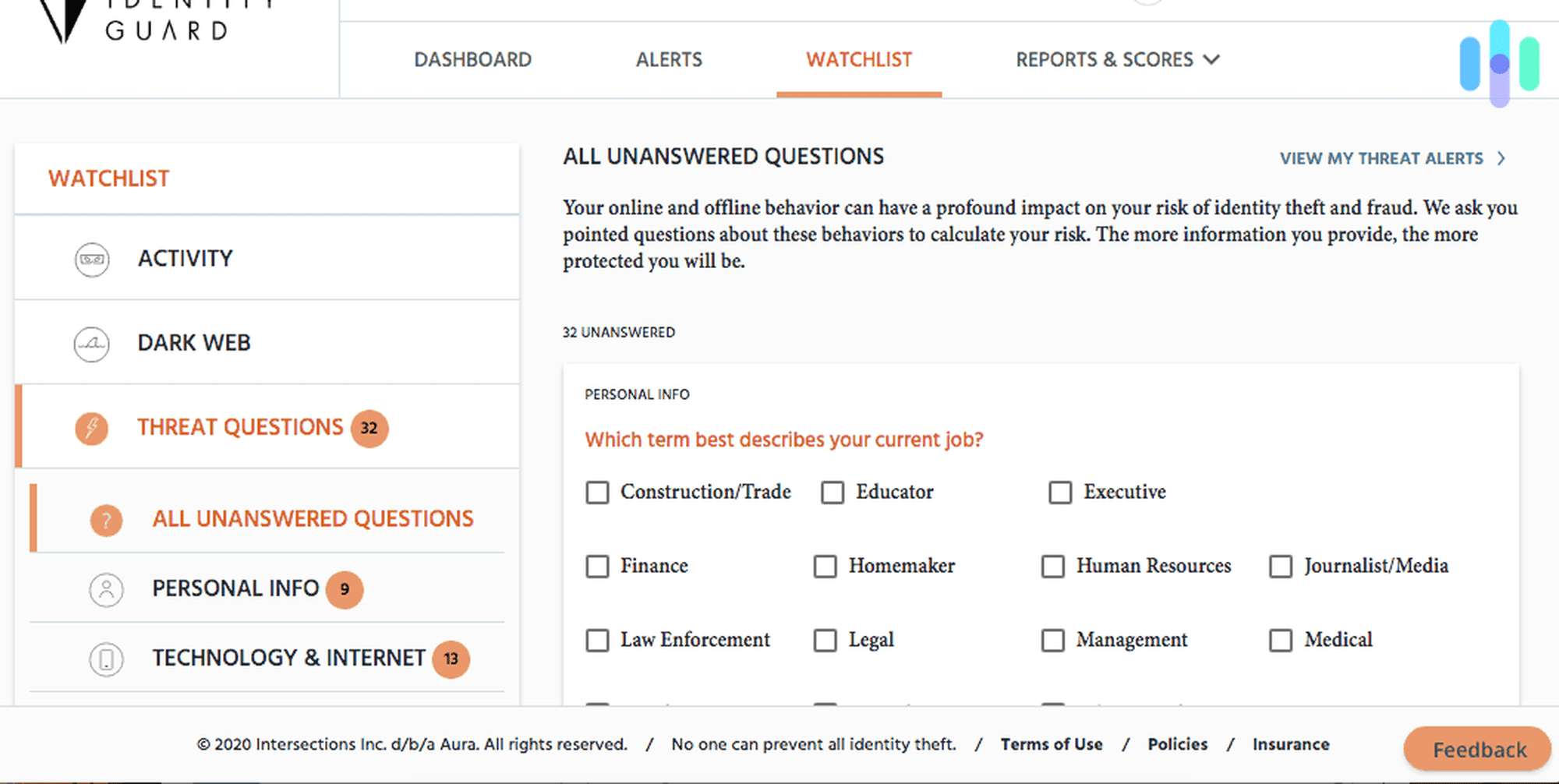
Once we’d input all our information, we navigated between the Dashboard, the alerts, and Watchlist, plus, our credit reports and scores*.
How Much Does Identity Guard Cost?
Identity Guard rewards annual commitments with substantial savings. Individual plans range from $8.99 to $29.99 monthly. Pay annually and those costs drop to $7.50 to $25 per month. That’s a savings of about 16 percent.
Besides individual plans, Identity Guard offers family plans, which covers up to five adult individuals and an unlimited number of children. Prices for family plans range from $14.99 to $39.99 if paid monthly, but again, discounts are available for first-year plans, as low as $12.50 to $33.33 per month if the year is paid upfront.
FYI: Identity Guard’s identity protection for minor members of family plans isn’t as comprehensive as its protection for adults. That’s why we strongly recommend teaching them five basic but crucial digital safety habits for teens. Identity protection starts at home, and with our help, the younger generation will learn how to best protect themselves from online dangers and identity theft.
Here’s a breakdown of Identity Guard’s regular prices and features for the three plans available: Value, Total, and Ultra.
| Features and pricing | Value | Total | Ultra |
|---|---|---|---|
| 401k and Investment Account Monitoring | No | No | Yes |
| Annual Credit Report from 3 Bureaus | No | No | Yes |
| Bank Account Monitoring | No | Yes | Yes |
| Credit and Debit Card Monitoring | No | No | Yes |
| Credit Monitoring from 3 Bureaus | No | Yes | Yes |
| Criminal and Sex Offense Monitoring | No | No | Yes |
| Customer Support Based in U.S | Yes | Yes | Yes |
| Dark Web Monitoring | Yes | Yes | Yes |
| Data Breach Notifications | Yes | Yes | Yes |
| High Risk Transaction Monitoring | Yes | Yes | Yes |
| Home Title Monitoring | No | No | Yes |
| Identity Theft Insurance with $1 Million Maximum Reimbursement | Yes | Yes | Yes |
| Monthly Credit Score from 3 Bureaus | No | Yes | Yes |
| Risk Management Report | Yes | Yes | Yes |
| Safe Browsing Tool | Yes | Yes | Yes |
| Social Media Insights Report | No | No | Yes |
| USPS Address Change Monitoring | No | No | Yes |
| White Glove Resolution Concierge | No | No | Yes |
| Monthly plan for individuals | $8.99/month | $19.99/month | $29.99/month |
| First year plan for individuals (price increases to the monthly rate after the first year) | $90/year | $200.04/year | $300/year |
| First-year savings with the annual plan | $17.88 | $39.84 | $59.88 |
| Monthly plan for families | $14.99/month | $29.99/month | $39.99/month |
| First-year plan for families | $150.00/year | $300/year | $399.96/year |
| First-year savings with the annual plan | $29.88 | $59.88 | $79.92 |
Identity Guard offers plans for business and personal use, and within those two categories, individuals and groups. Regardless of which subscription plan we selected, we chose between annual or monthly contracts. We had no trouble finding an Identity Guard plan that worked for us. Identity Guard has a plan for spouses as well, a rarity in the identity monitoring industry.
There are three Identity Guard plans to choose from – Value, Total, and Ultra. We chose the Ultra plan as it has the most coverage and was only $29.99 per month or $25 per month when paid annually for individuals. For families, it’s $39.99 per month or $33.33 per month when you pay for a year upfront.
All plans come with $1 million in identity theft insurance, so you don’t need to pay for the most expensive subscription for this protection. But you will need the Total or Ultra plan for bank account monitoring, three-bureau credit monitoring, and a monthly credit score check.
Identity Guard doesn’t offer free trials like Aura does, but it comes with a 60-day money-back guarantee. We think this is a good timeframe to test out the data removal service and all the monitoring features. If you prefer a free trial, we recommend checking out our IdentityIQ review and LifeLock review to see if they are a better fit.
Customer Support
Identity Guard provides 24/7 phone support staffed by U.S.-based representatives. This allows you to get personalized help anytime you need it. The company also maintains a comprehensive knowledge that can answer most account-based questions.
You can also submit a ticket or send an email, but we didn’t have a great experience using these methods. We sent an email Tuesday morning and didn’t get a response until Wednesday afternoon. On average, we found the wait time to be 24 to 48 hours, so we think you’re better off calling Identity Guard directly.
FYI: Identity Guard’s email support won’t handle some inquiries relating to sensitive information, like changing personal details or updating billing information.
Identity Guard: How It Compares to the Competition
Having discussed what Identity Guard does and how it helps protect its users’ identities, let’s see how it compares to other top options. In particular, let’s compare it to LifeLock and Aura.
The most noticeable difference is that LifeLock and Aura offer a suite of digital security tools like a VPN and antivirus protection. This isn’t an issue if you already have subscriptions for these services, but if you’re looking to bundle and save, you might be disappointed that Identity Guard isn’t an all-in-one solution like Aura and LifeLock.
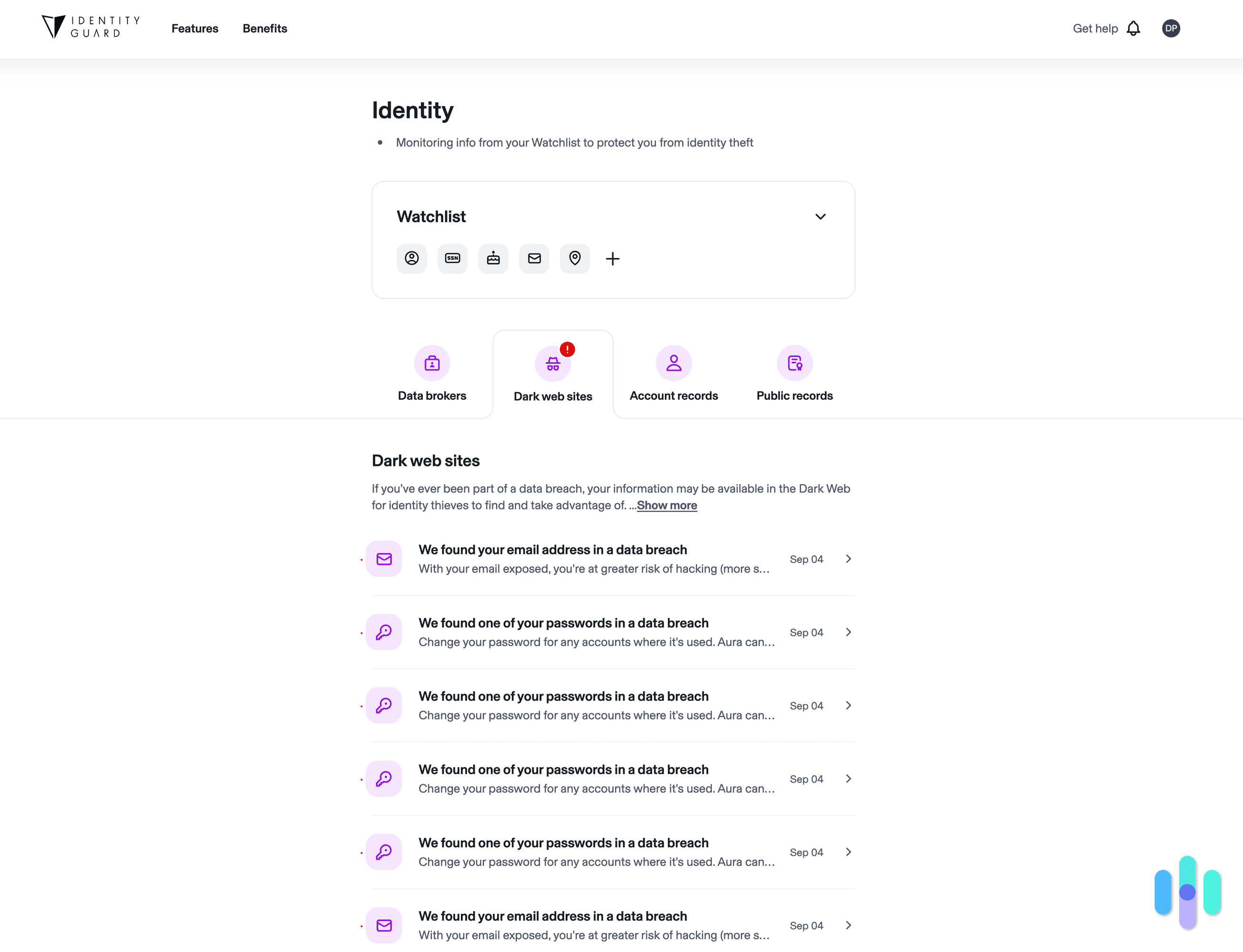
On the bright side, though, Identity Guard’s use of AI puts it on the same level as Aura and LifeLock in terms of detecting identity theft. Identity Guard’s AI and LifeLock and Aura’s broad monitoring coverage equally provide formidable identity theft protection.
Identity Guard, however, stands out for its price, especially if you’re looking to protect the entire family. The $12.50 per month starting price for the Value family plan is hard to beat. Although it’s not as comprehensive as Aura’s family plan, it offers tremendous value for those who want identity protection (without credit protection) on a budget.
All things considered, we’d say that Identity Guard holds up well against LifeLock and Aura, our two highest-rated identity protection services.
Can Identity Guard stand toe-to-toe with other brands? Find out below.
We tested Identity Guard and compared it side-by-side with other brands to give you the full picture.
Our Identity Guard Research and Data
The following is the data and research conducted for this review by our industry-experts. Learn More.
Encryption
| In Transit | Yes |
|---|---|
| At rest? | Yes |
| All network communications and capabilities? | Yes |
Security Updates
| Automatic, regular software/ firmware updates? | Yes |
|---|---|
| Product available to use during updates? | Yes |
Passwords
| Mandatory password? | Yes |
|---|---|
| Two-Factor authentication? | On mobile app, but not on browser |
| Multi-Factor authentication? | Yes |
Vulnerability Management
| Point of contact for reporting vulnerabilities? | customersupport@identityguard.com |
|---|---|
| Bug bounty program? | No |
Privacy Policy
| Link | https://www.identityguard.com/legal/privacy-policy |
|---|---|
| Specific to device? | No |
| Readable? | Yes |
| What data they log | Name, mailing address, email address, phone number, social security number, birthday, payment information, location information, credit reports, information from social media accounts, like Facebook friends, city specified you live in, content of posts and comments and cookies. |
| What data they don’t log | n/a |
| Can you delete your data? | No |
| Third-party sharing policies | Yes, Identity Guard shares information with third parties. |
Surveillance
| Log camera device/ app footage | n/a |
|---|---|
| Log microphone device/ app | n/a |
| Location tracking device/ app | Yes |
Parental Controls
| Are there parental controls? | Under family plan, can get alerts about child’s information on the dark web |
|---|
Company History
| Any security breaches/ surveillance issues in past? | No |
|---|---|
| Did they do anything to fix it? | n/a |
Additional Security Features
| Anything like privacy shutters, privacy zones, etc.? | n/a |
|---|
Recap
We think Identity Guard delivers robust identity protection at competitive prices. They pair their comprehensive monitoring with actionable alerts that help you protect your identity before it gets stolen. Though it lacks digital security bundles, Identity Guard remains a solid choice for dedicated identity protection. We found it great especially for families looking for affordable coverage.
It’s not the cheapest service around, especially if you want the whole nine yards, but you get the right value for your money.
Overall, we appreciated Identity Guard’s comprehensive features and low prices on the lower-tiered plans. However, we still felt anyone concerned about privacy might want to find an identity monitoring service that does not share information with third parties.
** Identity Theft Insurance underwritten by insurance company subsidiaries or affiliates of American International Group‚ Inc. The description herein is a summary and intended for informational purposes only and does not include all terms‚ conditions and exclusions of the policies described. Please refer to the actual policies for terms‚ conditions‚ and exclusions of coverage. Coverage may not be available in all jurisdictions.
* The score you receive with Identity Guard is provided for educational purposes to help you understand your credit. It is calculated using the information contained in your TransUnion credit file. Lenders use many different credit scoring systems, and the score you receive with Identity Guard is not the same score used by lenders to evaluate your credit.
Identity Guard® FAQs
-
Is Identity Guard any good?
Overall, we appreciate Identity Guard’s comprehensive features and low prices. However, we have some privacy concerns as a result of the service sharing user information with third parties.
-
Which is better, LifeLock or Identity Guard?
We rate Lifelock higher than Identity Guard. However, there are pros and cons to each service. While LifeLock offers more comprehensive coverage, that can mean higher costs and more complexity compared to Identity Guard. On the other hand, the budget plans from Identity Guard offer very minimal protection, even compared to similar cheap plans from LifeLock.
-
What does Identity Guard do?
Identity Guard monitors changes in our credit file as well as our checking and savings accounts. If changes are detected, Identity Guard alerts us through email, SMS, or the Identity Guard Classic app. There are also more cybersecurity features available, like dark web monitoring and anti-phishing software.
-
How much does Identity Guard cost?
Identity Guard plans range from $8.99 to $29.99 per month for individuals and $14.99 to $39.99 per month for families. If you pay for the first year upfront, you get 16 percent off the monthly rate.
-
Which identity protection tool is best?
Based on our tests, LIfeLock is currently the best identity theft protection tool, followed by Aura and Identity Guard. All of these services offer robust identity and credit protections, but LifeLock offers the most comprehensive coverage. It’s worth pointing out that Aura owns Identity Guard, so whichever service you choose, you’ll be dealing with the same parent company.
-
Where is Identity Guard located?
Identity Guard is located in the United States. That means that they’re under the jurisdiction of the three international surveillance alliances, Five Eyes, Nine Eyes and 14 Eyes. If there’s reasonable cause, the company could be forced to hand over customer information.
-
Global Anti-Scam Alliance. (2025). Alarming $17.3M Trade in Stolen Personal Data on the Dark Web.
https://www.gasa.org/post/alarming-17-3m-trade-in-stolen-personal-data-on-the-dark-web -
Cybersecurity & Infrastructure Security Agency. (2024). Transition to Advanced Encryption Standard (AES).
https://www.cisa.gov/sites/default/files/2024-05/23_0918_fpic_AES-Transition-WhitePaper_Final_508C_24_0513.pdf

